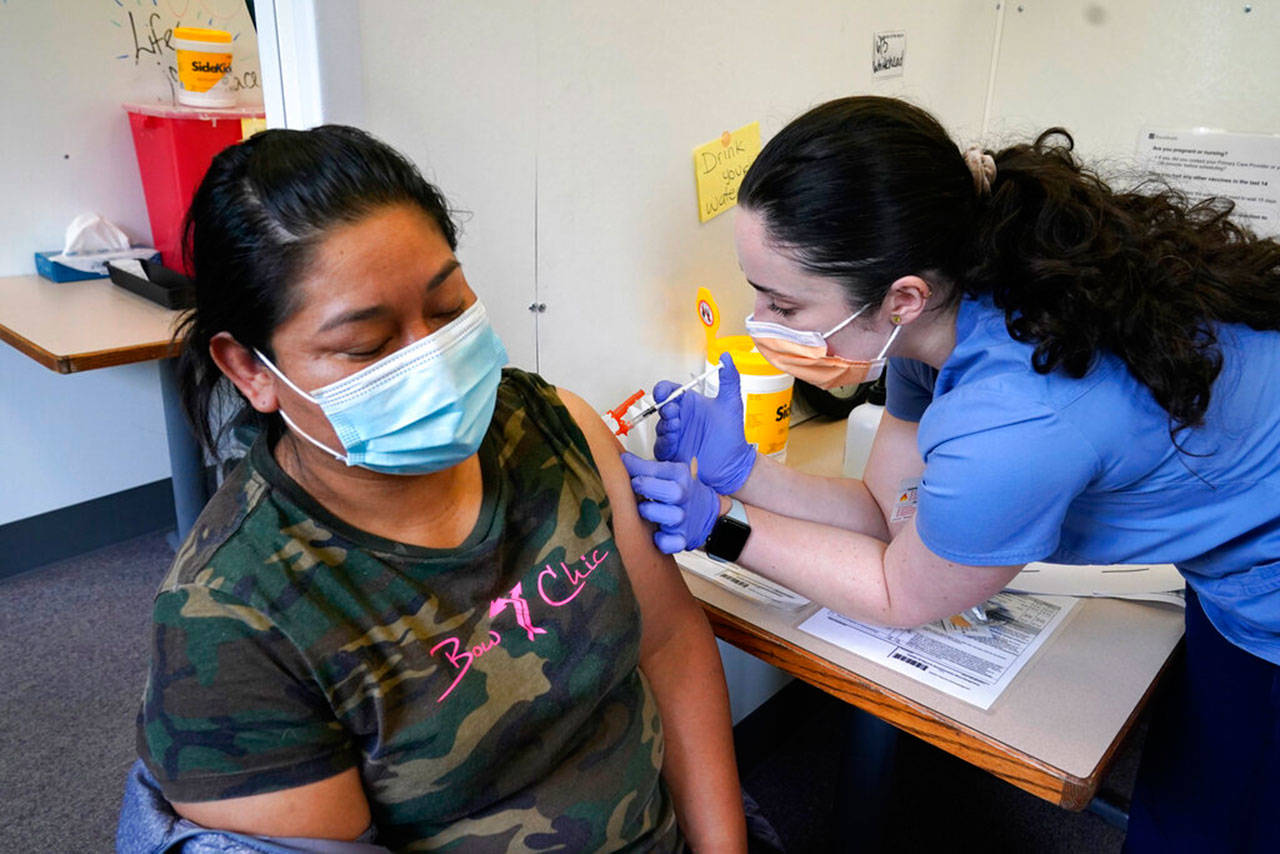By The Herald Editorial Board
Later today, someone in Washington state — specifically someone who has had at least one dose of one of the three covid-19 vaccines — will be $250,000 richer; less federal withholding, of course.
Another three $250,000 prize drawings will follow each week, concluding with a drawing for a $1 million prize. Other lottery prizes include airline tickets, tickets to sporting events, and — for those 17 and younger who aren’t eligible for the cash prizes — video game systems, smart speakers and a year’s worth of college tuition and other book and tuition assistance.
Washington state is among the latest states responding to dwindling demand for coronavirus vaccine by offering the lottery prizes as an incentive to convince those yet to receive their shot to roll up their sleeve.
It would be a point of pride if such incentives weren’t necessary; if those who were able to receive the vaccine stepped up on their own, without additional inducements beyond the vaccine being offered at no charge, itself. But we’ve seen a growing number of government and private sector incentives — literally, dollars to doughnuts — offered to convince those who were less-than-eager to get vaccinated. The offer to protect one’s own health and that of their families and the community ought to provide enough of a reason, but such persuasion has been around as long as there have been carrots. And sticks.
The latest data from the state Department of Health show that about 63 percent of state residents 16 and older have received at least one dose of vaccine; about 54 percent of those eligible — currently those 12 and older — are fully vaccinated. Gov. Jay Inslee earlier in the spring had set a goal to reopen the state fully by reaching either 70 percent of residents with at least one dose or by June 30, which ever came first. At the current rate, however, we may shave only a few days off the restrictions, if that.
We’re not likely to know quickly how effective the lottery prizes will have been in getting people vaccinated, but there is at least one early indication: an online resource — which connects to the state Department of Health’s database — where state residents can check their vaccination records; it was reportedly swamped late last week and was slow to show records. As of Monday morning the website, MyIR— wa.myir.net — still was sluggish but operable for those with patience.
The incentive program has already taken some heat from at least one state lawmaker, Rep. Jim Walsh, R-Aberdeen, who called the incentive a “crude huckster’s scheme” in a news release last week.
“Peddling a taxpayer-funded, lottery-style prize giveaway as an inducement to having a medical procedure is inappropriate,” Walsh said in the statement. “It is insulting and condescending to Washingtonians and embarrassing to the state. This is no way to govern a state made up of free people.”
Walsh, it appears, missed his booster shot for hyperbole.
Walsh went on to liken the incentives to “The Hunger Games” novels and movies as “an out-of-touch political elite” trying “to use a vulgar prize scheme to manipulate the masses,” and asked if those who were vaccinated agreed to be added to the database and have that information used for that purpose.
To some of Walsh’s points:
The prize money is coming from federal coronavirus relief funds; technically, yes, those are taxpayer funds, but it’s not coming out of state coffers. Other prizes, such as the airline and sports tickets and game systems have been donated.
Some of us aren’t up on our post-apocalyptic young-adult lit, but it seems a stretch to compare a lottery for vaccine recipients to a battle-royale fight to the death among teens armed with bows and arrows.
As for the state vaccination database, that information has long been collected and provides a handy record of vaccinations that is available only to the individual for themselves and their minor children. The state’s limited use of it for lottery purposes wouldn’t seem to risk a loss of privacy or personal information.
There have been legitimate concerns raised where such lotteries have been promoted both by Democratic and Republican state administrations. There is a risk that such promotions can lead some to become suspicious — or more so — as if they are being offered an incentive because it implies accepting risk. Others may come to expect such incentives, perhaps waiting on receiving a booster shot or a vaccine for the next pandemic until another lottery is offered.
Neither concern appears to apply here. Those who are truly suspicious of the vaccine — and about 1 in 5 say they will refuse the vaccine under most circumstances — were never going to be convinced, whether it’s a lottery prize or a personal appeal from Anthony Fauci. And because the prizes are being offered to all vaccine recipients — and not just those who waited until now — there’s less likelihood that the prizes would become an expectation and a reason to wait.
With the goal of vaccinating as many people as possible — to protect those who can’t be vaccinated because of their age or for health reasons — it was expected that we’d reach a point where the numbers of those who recognized the need and were eager to get vaccinated would tail off, leaving the procrastinators and those who are potentially willing but hesitant.
If a lottery helps convince more of those folks to get a shot or two in the arm, everybody wins.
Talk to us
> Give us your news tips.
> Send us a letter to the editor.
> More Herald contact information.

























